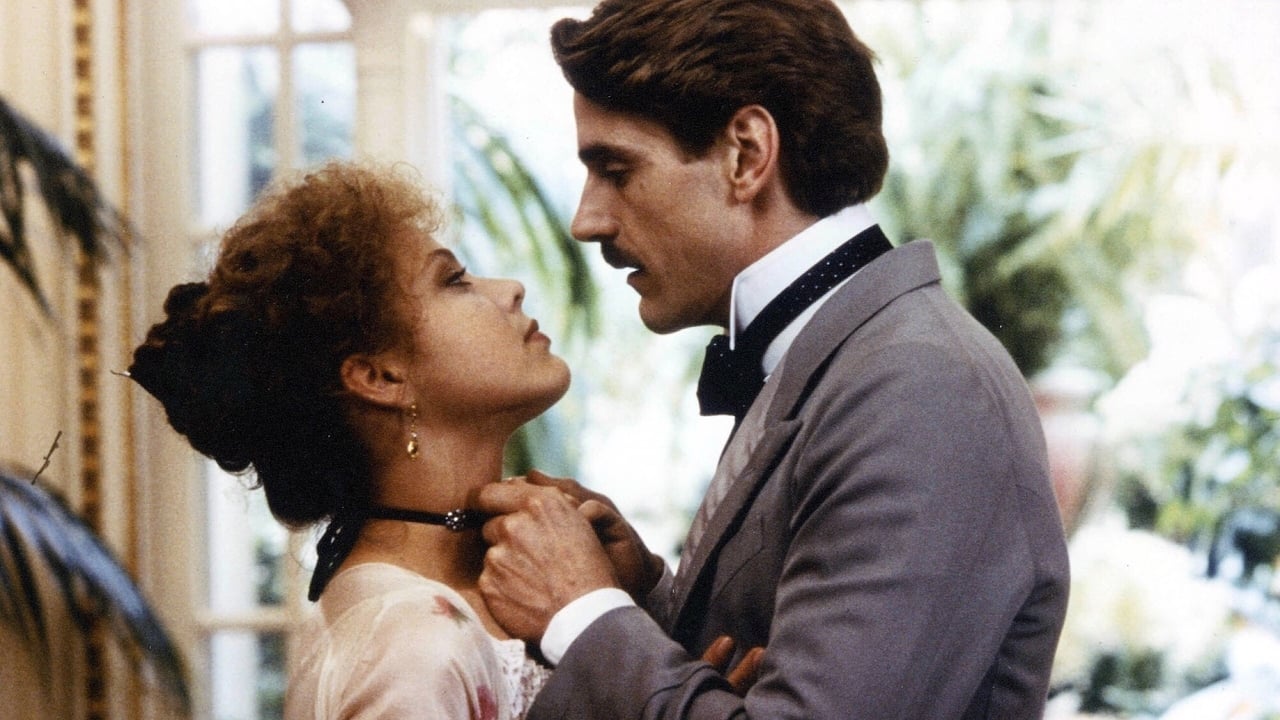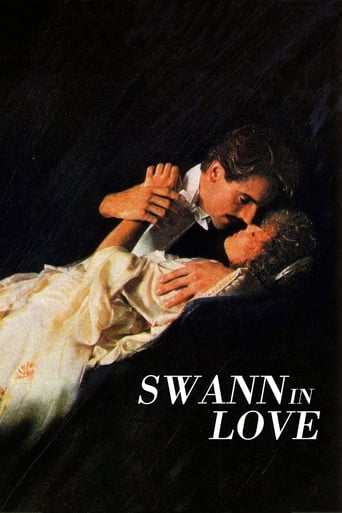Monkeywess
This is an astonishing documentary that will wring your heart while it bends your mind
Mehdi Hoffman
There's a more than satisfactory amount of boom-boom in the movie's trim running time.
Jakoba
True to its essence, the characters remain on the same line and manage to entertain the viewer, each highlighting their own distinctive qualities or touches.
Dana
An old-fashioned movie made with new-fashioned finesse.
Howard Schumann
In Volker Schlondorff's Swann in Love, Jeremy Irons is Charles Swann, a cultured aristocrat who is in love with Odette de Crécy (Ornella Muti), an alluring courtesan. Much to his undying frustration, however, Odette shares her pleasures with numerous men and women, keeping the passionate Charles at arms length while continuing to take advantage of his cultural and financial largesse. Written by Peter Brook, Jean-Claude Carriere and Marie-Helene Estienne, the film is an adaptation of the second part of Swann's Way, the first book of Marcel Proust's epic seven-volume masterpiece In Search of Lost Time.Set in Paris in the 1880s, the film is a recollection by a now aged Swann of a single day in his life as he attends dinner parties and salons, mingles with the upper crust, and pursues his courtship of Odette. Though Madame Verdurin (Marie-Christine Barrault), a fixture at the gatherings, sees Swann as unworthy of Odette and has unkind words about him, he evokes sympathy from the Duchesse de Guermantes (Fanny Ardant) who appears to also have designs on him. Swann's love for Odette feels a bit obsessive when he compares her face to a Botticelli face in a painting in the Sistine Chapel, yet we may be able to recall in our own life how love can be all consuming to the point where the lover takes on attributes far beyond the reality of their true nature.Swann in Love is a valiant attempt to translate a literary masterpiece into film and is strongly supported by the cinematography of Sven Nykvist, yet it fails to capture Proust's depth of characterization, artistic imagination, or poetic sensibility, opting instead for superficial posturing, long glances, and shallow voice-overs. The highly educated and artistically sophisticated Swann, in a lifeless performance by Irons, is depicted as little more than a humorless snob who is rejected by others of his social station because of his love for Odette, but who continues to pursue her out of obsession or sheer obstinacy. In the reality of Proust, however, his love for her is so deep that he can overlook almost any flaw in her makeup, her constant lying, her lack of appreciation of art, music, and poetry, and her broad tastes in sensual pleasure.There are others ways that Schlondorff gets it wrong. Although Odette is in fact a courtesan with all that it implies, she is hardly the unintelligent tart depicted in Muti's characterization. Also, the homosexual affair of the Baron de Charlus (Alain Delon) does not become part of Proust's story until many volumes later and does not belong in the film. One would think that, at the very least, the director would utilize a late romantic work of Gabriel Fauré or Camille Saint-Saens as the model for the enchanting sonata by the fictional composer Vinteuil that brings Charles and Odette together, yet Schlondorff instead opts for the modern atonal music of Hans Werner Henze, a choice that feels totally incongruent with the place and time. With all due respect for Schlondorff's valiant attempt to translate Proust into film, Swann in Love is one effort that should have remained on the drawing board with a "someday" tag attached.
Armand
strange construction. remarkable recreation of atmosphere, few drops of Proust novel -as discreet homage - a nice Charlus, a voluptuous Odette and correct Swann. details of a world in who mannerism is part of fall. good acting, interesting description of obsession, seductive tale about life style of aristocracy levels. and if you do not read the confession of Marcel, all is OK. but in case of error, the taste is not good. a slice of perfect universe remains a slice. the good intentions are far to be steps of adaptation. the flavor is present, the voices are at perfect place, the images are parts from the cake but result is a poor drawing. sure, it is an exercise." A la recherche de temps perdu" is out of any adaptation. but important is the fact than it is not a really disappointing film. that is the key.
tieman64
A section of Marcel Proust's supposedly unfilmable novel, "Rememberances of Things Past", is filmed by German director Volker Shlondorff in "Swann in Love".Actor Jeremy Irons plays our titular hero (Charles Swann), a nineteenth-century gentleman whose Jewishness irks the Parisian elite. What can they do to remove him from their ranks? More importantly, how can they get rid of him without getting their hands dirty? Many works of art have dealt with Jewish outsiders, but few turn antisemitism into such a shrewd game of cloak and daggers. The social circles Swann frequents don't just want to kick him out, they want Swann to kick himself out. To condemn himself. Only in this way will their preserve their own chasteness.Of course Swann's downfall soon comes. He becomes infatuated with Odette de Crecy, a manipulative woman who seduces Swann into marriage. She just wants his money. He just wants to conquer her and add her to his treasure chest of arts and riches. When they are married, and Odette's sordid past is revealed, Swann's enemies finally have the pretext for ostracising him. By the film's end, Swann has lost everything – money, fame, power, status, wife – and becomes yet another victim to human folly.The film's cast is fine (particularly Irons, Alain Delon and Ornella Muti as Odette), but Shlondorff isn't strong enough a visualist to tease out their passions or fully milk his tale's tragedy. Some visuals work tremendously – opera stages used to highlight the faux-graciousness and play-acting of society's upper echelons, and a few sensitive fantasy sequences – but similar tales have been better told elsewhere.7.9/10 – Worth one viewing. For a more zany take on this material, see "Phantom of the Paradise". See too Slondorff's "Ogre" and "The Ninth Day".
taylor9885
For a long time I've thought that the Nobel Prize should go to a filmmaker, and who better than Volker Schlondorff. He has taken so many literary classics and turned them into fine films--Young Torless (Musil), The Tin Drum (Glass), Coup de Grace (Yourcenar), Michael Kohlhass (Kleist), The Ogre (Tournier) and many more. He has worked in Germany, France and the US and shows great ability and imagination always. This is the first film adaptation of Proust and it is wonderful in many places. The long sequence at Odette's house when an hysterical Swann goes on a rampage--looking for the source of the sound he imagines he hears--only to drive Odette into a fury as she smashes a vase is a classic of modern filmmaking. The pettiness and claustrophobia in the lives of aristocrats circa 1900 is superbly brought out. Sven Nykvist is the cinematographer (deep black night scenes, lovely) and Hans Werner Henze wrote the superb music: it's like another actor in the story; jangled, dissonant sound accompanying Swann's frantic travels through Paris.

